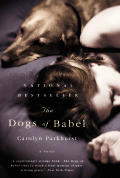
| Publisher: | Back Bay |
| Copyright: | June 2003 |
| Printing: | June 2004 |
| ISBN: | 0-316-77850-8 |
| Format: | Trade paperback |
| Pages: | 264 |
I don't read much in the mainstream novel genre (and yes, it is a genre in its own right), and read this book only because my grandmother had picked it up on a whim and my dad was engrossed in it. It's even (to some degree) about the sex lives of an academic, fitting another genre stereotype. But, somewhat to my surprise, I'm very glad that I read it.
The book opens with the death of Paul's wife Lexy, falling from an apple tree in their back yard while Paul was teaching and breaking her neck. The only witness was their dog Lorelei. Paul, a linguistics professor, is the narrator, and the reader sees the story through the lens of his emotional reaction. There are a few strange anomalies about Lexy's death, and Paul starts worrying at the puzzle, finally becoming obsessed with teaching Lorelei how to talk to learn what really happened that last day. That story is interwoven with flashbacks that tell the history of Paul and Lexy's relationship.
The attempt to teach the dog to talk is the hook, but becomes less important over the course of the story (a relief, as it's also quite odd and leads the story to some truly strange places). This book is not a murder mystery, even if it may sound like one initially. Rather, the mystery surrounding Lexy's last day is more a substitute for the mystery of death and the search for a true understanding of a loved one, and Paul's questioning becomes gradually identified with his grieving process. Similarly, the attempt to teach the dog to talk is important mostly for what it says about Paul's state of mind and the ways in which he attempts to grapple with the world: it is the only academic, investigative way he can find to react to Lexy's death. Of the two timelines, the flashback to the development of their relationship is by far the strongest.
Words like sweet and charming come to mind to describe Paul and Lexy's relationship, and that part of the book is a satisfying, bittersweet love story. The little bits of romance between them, particularly early on, bring a smile to the face, and are saved from feeling too cloying by Paul's quiet, detached way of telling their story. Parkhurst's choice of narrative voice here is excellent. A narrator who reinforced the love and grief of the story would have made the emotions too strong, overwhelming subtle nuance. Paul's soft, occasionally unreliable voice instead won me over, taking the edge off enough to see the complexities of pain and happiness under the events and helping me feel what he felt.
Like many mainstream novels, the characters and the emotions are the story; the plot is the arc of love and grief, only occasionally sprinkled with supporting characters and few significant events. The book lives and dies with the two main characters, Lexy living only in Paul's memories and through his perspective, her portrait growing more complex and more complete as the book progresses and Paul is able to face more than his ideal memories. I found it fascinating how well the cycles of grief and love coincided. The initial denial of grief matches the ideals of a new relationship, and his more realistic and accepting attitudes later match up with a more complex married relationship with its problems and triumphs. I liked Lexy better the more complex she grew, and I think her portrayal is my favorite part of this book.
Parkhurst brings both strands to a sadly beautiful conclusion. The ending is emotionally satisfying without marring anything that had come before, which is hard to do with a book about grief. Particularly for a first novel, this is excellent work; I wished at times for a bit less of the talking dog plot, but the pacing is excellent and never leaves the reader in uncomfortable places for too long.
This is a softly moving book, an excellent character portrait. Don't pick it up looking for a strong plot or a lot of action, but Parkhurst has a skilled touch with moments, vignettes, and the private rituals and references that grow up in a relationship. If you pick this up when you're in the mood for something quietly emotional, I don't think you'll regret it.
Reviewed: 2005-10-21